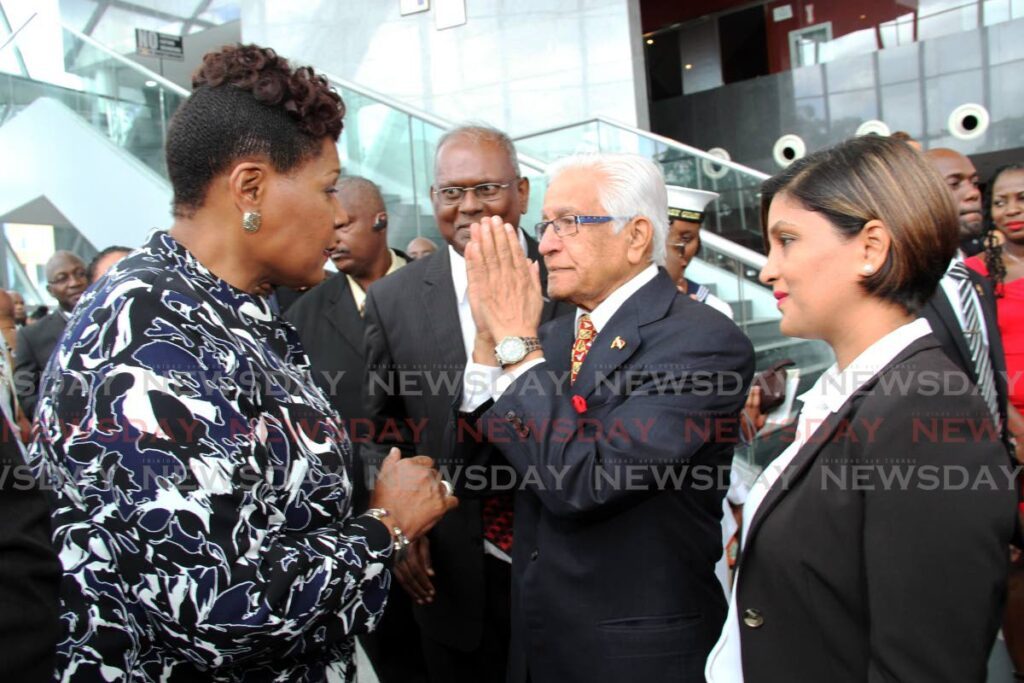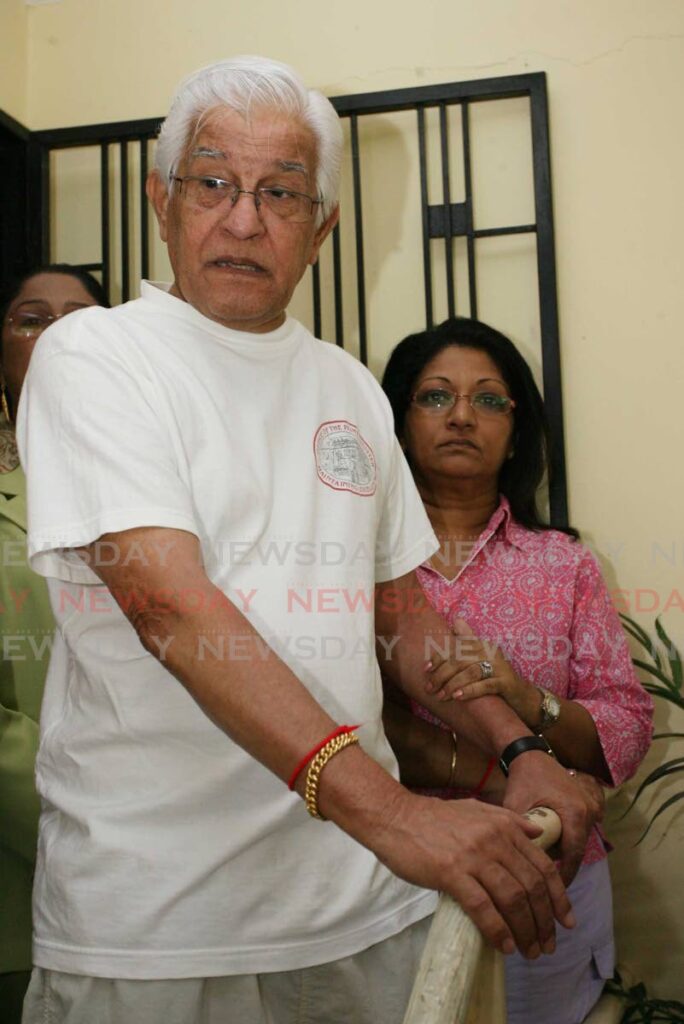Case of the Diamond Reserve account – Panday's integrity trial

THE BANK account number was 39036189. He gave several reasons for not declaring it. At first, in reply to correspondence from the Integrity Commission seeking explanation, he did not seem to know whether the joint account existed since he was awaiting a reply from UK bank officials about it. Then, he said he believed the account was his wife’s and that it was money held in trust for the education of their children. Next, he said he was mistaken; the account had been opened to pay for heart surgery. At the trial before Sherman McNicolls, the chief magistrate, yet another explanation emerged: the money was a scholarship from Lawrence Duprey, the business magnate, but he did not know of this financial assistance since finances in Hindu families are handled by the wife.
On the eve of the new millennium, in the years 1997, 1998, and 1999, the money increased at a rate exceeding his income. The total accumulated year-end balances for the account for the three years was £159,600.35, which would be, factoring inflation, roughly £291,457 – or TT$3 million – today.
Basdeo Panday will be remembered for many things. But history records him as the first, and to date only, former prime minister to stand in a prisoner’s dock on criminal charges. Although his political enemies speculated, during his time as PM from 1995-2001, about various matters including those relating to Desalcott, Tidco, the purchase of food and drink at the official residence and the project to build an airport at Piarco, it was for knowingly filing false paperwork that he was convicted by McNicolls in a 2006 criminal trial. The conviction was later quashed because of “apparent bias” relating to the magistrate, who, at the very end of his ruling had said, suspiciously, “my mind is free of all sorts of influences.” Attempts at retrial were thrown out in subsequent years as abuse.
Nonetheless, the circumstances of this case remain one of the most disturbing chapters in TT’s history. They reveal the toxic consequences of what occurs when unbridled partisan interests collide with constitutional arrangements vulnerable to interference, real or perceived. There is no other case that more strongly supports the need for the constitutional reform Panday himself strongly lobbied for in life.
There was, thus, something serendipitous in judges not being invited to the former prime minister’s state funeral last Tuesday. Still, many individuals in the auditorium at the Southern Academy for the Performing Arts would have been familiar with the entire saga.
Anthony Carmona, the former president who this month called for the Order of TT to be bestowed on Panday posthumously, was the judge who held the unenviable task of deciding whether Panday should be given bail after McNicolls handed down a sentence of two years’ hard labour on each of three counts brought under section 27 (1)(b) of the Integrity in Public Life Act 1987. Paula-Mae Weekes, Carmona’s successor, who sat beside him in the audience, was on the Court of Appeal panel that ordered a retrial based on apparent bias after all manner of behind-the-scenes machinations involving McNicolls, PNM political officials and business figures emerged. Ivor Archie, the Chief Justice, was on that panel too.
Even the Prime Minister is a part of the Panday narrative. Dr Rowley’s landmark legal battle with the Integrity Commission, which highlighted the body’s seeming penchant to misconduct itself by precipitously referring reports to the office of the Director of Public Prosecutions without giving their subjects a fair hearing, was cited in one case in which a magistrate threw out attempts to retry Panday. Such is the epic, decades-long scope of the saga of the NatWest “Diamond Reserve” account held in Mr Panday’s name in Wimbledon.
‘We spent a lot on those probes’
Rarely has the murky underbelly of politics in this country come so clearly into focus as in this case. If a society truly believes no one is above the law, the Panday integrity trial was a watershed moment. But it also raised the spectre of another possibility: political prosecutions breaching the separation between the executive and the independent office of the Director of Public Prosecutions, an office funded by the State under our current constitutional arrangements.
Panday’s supporters have long believed the charges were pure politics. They were bolstered in their view given the selective way in which the UNC political leader seemed to have been targeted: to date the 2006 case remains the only attempt at prosecution under the Integrity law.
The timing of the case did not aid matters. While the trial was in 2006, the charges were first laid in 2002, in the tense period between the famous 18-18 tie and Patrick Manning’s calling of an election. The PNM leader, on the political hustings, did not conceal his administration’s efforts to probe Panday, who had, after entering power on the strength of a coalition in 1995, previously won a second term but whose administration collapsed in 2001 amid a rebellion in his ranks. There were suggestions that a private investigator had been hired, on behalf of the government, to probe Mr Panday and that findings were sent to the Integrity Commission and then rushed to law enforcement officers.

“Those matters require speedy action,” Glenda Morean-Phillip, the PNM attorney general at the time, said of ongoing investigations in July 2002. “We spent a lot of time and money. I would want to see it executed with some sense of urgency.” The Central Authority, which handles international requests for information and various forms of collaboration across borders, as well as the Anti-Corruption Investigations Bureau, fell under the office of the AG.
On September 4, 2002, Manning told reporters if he were in Panday’s shoes, he would not stop government moves to investigate his account.
“I could tell you, if the government wishes to look into my account, I would make no attempt to block it,” the PNM leader said. “In fact, I would give them the accounts. I have nothing to hide.” He dismissed suggestions of anything improper about the investigations. “We made it clear that we set up independent arrangements to investigate those matters and they are being investigated by those independent arrangements.”
Charges were laid that month, a month before the election, which the UNC then lost.
Prosecutors are, in theory, independent. They deal with facts and the likelihood of conviction and balance a range of issues. Should it have mattered where any information in the case potentially came from? Panday’s supporters would say yes. However, enough floating voters said no, paving the way for his narrow election defeat to Manning. A conviction with a long sentence is a bar to public office; a charge would have rightly worried many.
If this case was a reason Panday was never able to return to Whitehall, it was also the lowest point in the careers of figures like Satnarine Sharma, the chief justice (now deceased) as well as McNicolls (now deceased).
Infamously, CJ Sharma, on a flight, reportedly chatted with the prosecutor in the Panday case, informing him the finances in Hindu households were handled by the wife – the very defence adduced by Panday. There were also allegations the CJ seemingly met with and pressured McNicolls, his one-time friend, over the case.
Yet, McNicolls refused to testify at a criminal trial brought, separately by prosecutors, against the CJ for allegedly attempting to pervert the course of justice, saying he preferred civil proceedings – a move which made McNicolls subject to disciplinary charges by the Judicial and Legal Service Commission. When the Sharma civil proceedings emerged in the form of the Mustill enquiry, triggered by Manning, the AG at the time, John Jeremie, did not testify.
Still, the Mustill enquiry brought to light all manner of machinations around the chief magistrate, including a mysterious cheque and a land transaction that crystallised right in the middle of the Panday trial. “The picture presented to this tribunal almost defies belief,” Lord Mustill found, when he later cleared Sharma. The fallout was the Panday conviction, which could not stand given all that had emerged.
A failed integrity test
Panday had an acrimonious relationship with the media. For instance, in 1996, he exerted pressure to get editor Jones P Madeira fired over a headline in the Guardian newspaper. He also promulgated a controversial green paper entitled Reform of Media Law: Toward a Free and Responsible Media. He was sued for libel, and lost, when he scathingly lambasted one of the green paper’s critics on a political platform.
Yet, it was the fact that the media did its job that ultimately saved Panday. It was the rolling coverage of the intrigue and commess of the entire saga made findings of apparent bias inevitable. When correspondence detailing apparently separate attempts by PNM officials to directly pressure prosecutors to charge Panday emerged even after the 2006 trial, in yet another leak, this seriously undermined the likelihood of any criminal proceedings ever holding before a jury.
In a sense, the biggest fallout, however, has been in relation to the Integrity Commission itself. It has never really recovered from this terribly botched test case. The evidence of this may well be the seemingly blasé way politicians, both UNC and PNM, today admit to not filing their statements of assets and income on time without any seeming fear of consequences. Cynicism and distrust prevails. This has proven convenient. Accountability for people in public life has arguably been stymied.
Ultimately, it remains an open question what impact, if any, the costly Integrity Commission bank account case will have on Panday’s legacy given its outcome. While politicians relish the idea of becoming martyrs for a cause, he admitted to the strain of legal matters in later years. A separate criminal case in relation to the Piarco International Airport was thrown out last year, though matters relating to that project under his tenure appear to still be alive. Some people charged pled guilty decades ago in US courts. The current government has loudly pursued and won a civil case abroad. Equally, key PNM officials have been accused of botching aspects of the management of the case.
In 2007, when he was seeking to return to office in that year’s general election under a rebranded UNCA banner, Panday donned a beret and had a signal for a political rally that had gathered on the eve of the poll. “Give me the last chance to take you to the promised land,” he said to the crowd, citing his age. “I ask you to send me off in a blaze of glory.” Can we read some admission of failure into these entreaties? We will never know for sure. But when the dust settled, voters certainly did not give him that second chance.


Comments
"Case of the Diamond Reserve account – Panday’s integrity trial"